
Select City
Need surgery for appendicitis? Pristyn Care offers expert appendectomy procedures, including laparoscopic and open techniques, for safe and effective appendix removal. From consultation to recovery, our surgeons ensure personalised care at every step. Book your appendectomy with Pristyn Care today and get treated by experienced doctors using advanced technology.
Need surgery for appendicitis? Pristyn Care offers expert appendectomy procedures, including laparoscopic and ... Read More




Free Cab Facility

No-Cost EMI

Support in Insurance Claim

1-day Hospitalization

USFDA-Approved Procedure
Choose Your City
It help us to find the best doctors near you.
Ahmedabad
Bangalore
Bhubaneswar
Chandigarh
Chennai
Coimbatore
Delhi
Hyderabad
Indore
Jaipur
Kochi
Kolkata
Kozhikode
Lucknow
Madurai
Mumbai
Patna
Pune
Raipur
Ranchi
Thiruvananthapuram
Vijayawada
Visakhapatnam
Delhi
Hyderabad
Pune
Mumbai
Bangalore
An appendectomy is a surgical procedure to remove the appendix, a small, finger-shaped pouch attached to the large intestine on the lower right side of the abdomen. It is commonly performed as an emergency treatment for appendicitis, which occurs when the appendix becomes inflamed or infected.
Appendectomy is the most effective and widely recommended appendicitis treatment, especially when there is a risk of rupture. The appendix does not serve a vital function in the body, so its removal does not cause any long-term health issues.

Fill details to get actual cost
If appendicitis is not treated in time, it can become a life-threatening condition. Immediate appendectomy is usually recommended to avoid serious health risks. Here is what can happen if acute appendicitis treatment is delayed:
Untreated appendicitis can also:
If you are scheduled for appendectomy, here is what usually happens before the procedure:
Once your diagnosis is confirmed, you will undergo appendectomy to safely remove your inflamed appendix. The steps can vary depending on the type of surgery be it laparoscopic or open appendectomy.
This is the preferred option for many patients at Pristyn Care due to faster healing and minimal scarring.
Note: In rare cases, if the appendix has ruptured or infection is widespread, the surgeon may switch to an open appendectomy procedure.
This method may be used if:

Diet & Lifestyle Consultation

Post-Surgery Recovery Follow up

Free Cab Facility

24*7 Patient Support
After your appendectomy, the recovery process depends on the type of procedure performed and whether any complications were present. Here is what to expect following appendix removal:
While an appendectomy is a common and generally safe procedure, like any surgery, it may carry certain risks. The chances of complications are higher if the appendix has burst or if the patient has underlying health conditions. Here are some possible appendectomy risks and complications:
After appendectomy, you may experience some side effects as your body heals. These are usually temporary and resolve on their own or with mild treatment.
Common post-surgery side effects include:
Among the two main types of appendectomy, laparoscopic and open surgery, most patients and surgeons prefer the laparoscopic appendectomy due to its many advantages. Here are the key benefits of appendix removal:
Following proper post-surgery instructions can help reduce the appendectomy recovery time and avoid potential appendectomy risks like infection or complications. Here are some important dos and don’ts to keep in mind after appendix removal surgery:
Proper care of your laparoscopic appendectomy incision sites or open surgery wound helps prevent infection. Follow your surgeon’s advice on how to clean the area.
Always follow your appendectomy doctor’s instructions when taking painkillers or antibiotics. Only use medicines prescribed for your recovery.
After the appendectomy procedure, your digestion may be slow. Begin with soft or bland foods and gradually return to your normal diet as advised.
Gentle movement, such as walking, improves blood circulation, reduces the risk of blood clots, and helps your bowels return to normal. Do not remain completely still for long periods.
Your body needs time to heal. Listen to your body and rest as needed during the early stages of acute appendectomy recovery.
Keep all follow-up appointments to monitor your healing and manage any issues early.
Avoid lifting heavy objects, climbing stairs too often, or engaging in intense activity that could stress your abdominal muscles, especially after open appendectomy.
Until your stitches dissolve or are removed, avoid swimming or taking baths. Stick to sponge baths or quick showers if cleared by your doctor.
Skipping antibiotics or pain relief medications can slow down healing or increase the risk of infection.
Let your digestive system ease back into its normal routine. Eating heavy or greasy food too soon may lead to nausea or bloating.
Contact your doctor immediately if you experience:
The usual appendix surgery recovery time is about 1 to 3 weeks at most. The patient will be able to return to work and resume daily activities within a week. Some instructions will be given by the doctor for faster recovery. If you follow all the instructions carefully, you will be able to fully recover in the given time frame.
The results of an appendectomy are immediate as the patient will get relief from the symptoms right after the surgery. There are zero chances of recurrence of appendicitis as the organ itself is removed during the procedure.
An appendectomy usually takes around 30 to 60 minutes, depending on whether it is a laparoscopic or open procedure.
Appendectomy has a high success rate and is considered the standard and most effective appendicitis treatment.
Yes, appendectomy is classified as a major surgery, but it is routine and performed safely across the world.
Mild to moderate pain is normal after surgery, but it is manageable with medications prescribed by your doctor.
Yes, you can live a completely normal life after appendix removal, with no long-term dietary or lifestyle restrictions.
Most health insurance plans cover appendectomy procedures, but exact coverage depends on your policy and provider.
The cost of appendectomy in India generally ranges between ₹50,000 and ₹82,000, depending on the hospital, city, and surgery type.
Yes, it is a safe and common procedure, though like any surgery, there are minor appendectomy risks such as infection or bleeding.
Appendix removal is one of the most frequently performed emergency surgeries for acute appendicitis treatment.
Contact your doctor if you have fever, severe pain, swelling, pus from incision sites, or difficulty passing stool.
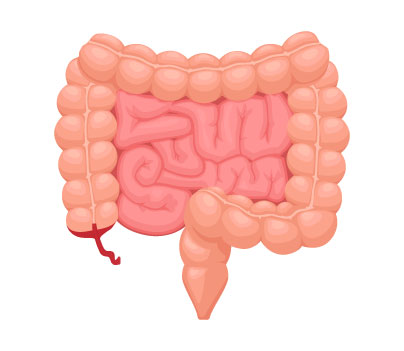
Grade I
Early Appendicitis
In this stage, you are likely to feel the pain near your navel, and it might feel like a cramp, and you probably would not be able to pinpoint the affected area. This is usually the first sign of a possible inflammation in your appendix, and you might also go through other symptoms like loss of appetite, followed by nausea and vomiting.
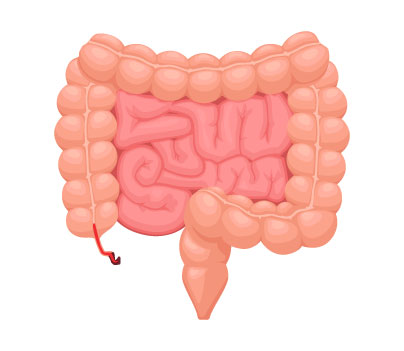
Grade II
Suppurative appendicitis
This is the stage where the bacteria and inflammatory fluids accumulated in the lumen of the appendix enter the muscular wall of the appendix and subsequently cause intense pain when the inflamed membrane rubs against the parietal peritoneum lining the abdominal cavity. You will experience a shift of pain from the belly button area to the lower right abdominal area in this stage.
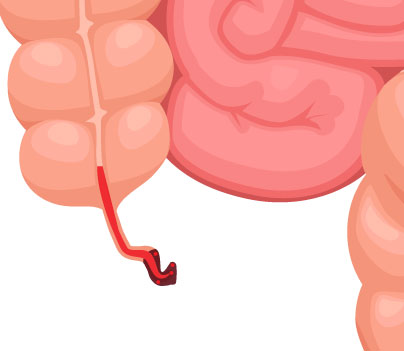
Grade III
Gangrenous appendicitis
At this stage, the blockage of the appendix leads to inflammation and increased pressure, preventing blood flow into the organ. Such a condition is considered a medical emergency. If the patient does not receive proper treatment on time, it can result in the breaking or tearing of the appendix, which can have severe complications.
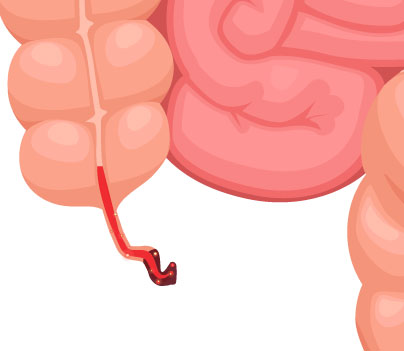
Grade IV
Perforated/Ruptured appendicitis
Sometimes the infection of an appendix can result in the formation of a hole that allows the infection to spread to the other parts of the abdomen. During such cases, the stool that is stored inside the appendix leaks out into the abdomen, which then results in an inflammatory reaction by our body, creating abscesses. Due to the inflammation, the bowel gets easily crumbled, making it difficult for surgical removal. These intra-abdominal abscesses can cause prolonged fever and pain and can result in a slow recovery.
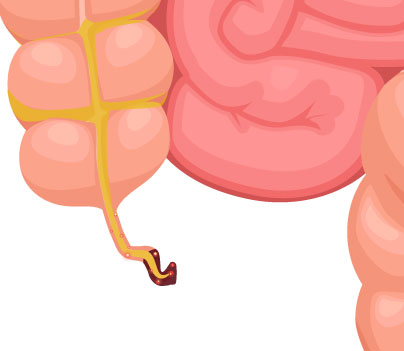
Grade V
Phlegmonous appendicitis or abscess
An inflamed or perforated appendix can sometimes be separated by the adjacent greater omentum (a double-layer of fatty tissue that covers and supports the organs and intestines in the lower abdomen) or by a complete blockage of the small intestine, resulting in phlegmonous appendicitis or abscess, leading to a swollen, reddened, thickened and compacted appendix.
Dikesh Joshi , 30 Yrs
Recommends
Got my appendix removed from from doctor shashank. The treatment went well and now i am feeling good.
Ashwath Kumar, 41 Yrs
Recommends
Good treatment and care from the staff and doctor.
Ramesh Solanki, 37 Yrs
Recommends
Rushed to Sheetla with intense pain. Diagnosed and operated within hours. Grateful to the entire team. They really saved me from a big issue. Once again, thank you so much, Docotor Daiyapan Ghosh, for your excellent support and care.
Meenal Joshi
Recommends
I was worried about going under the knife, but the laparoscopic appendectomy was surprisingly smooth. The staff at Pristyn Care Elantis were so attentive, and the doctors made sure I understood every step.
Kajal Sinha
Recommends
Appendix pain ke baad emergency surgery hui. Doctors ne timely decision liya aur sab kuch smoothly ho gaya
Preeti Sagar
Recommends
Appendix ka pain unbearable ho gaya tha. Laparoscopic surgery Pristyn Care Elantis mein hui and mujhe bahut relief mila
.svg)
.svg)